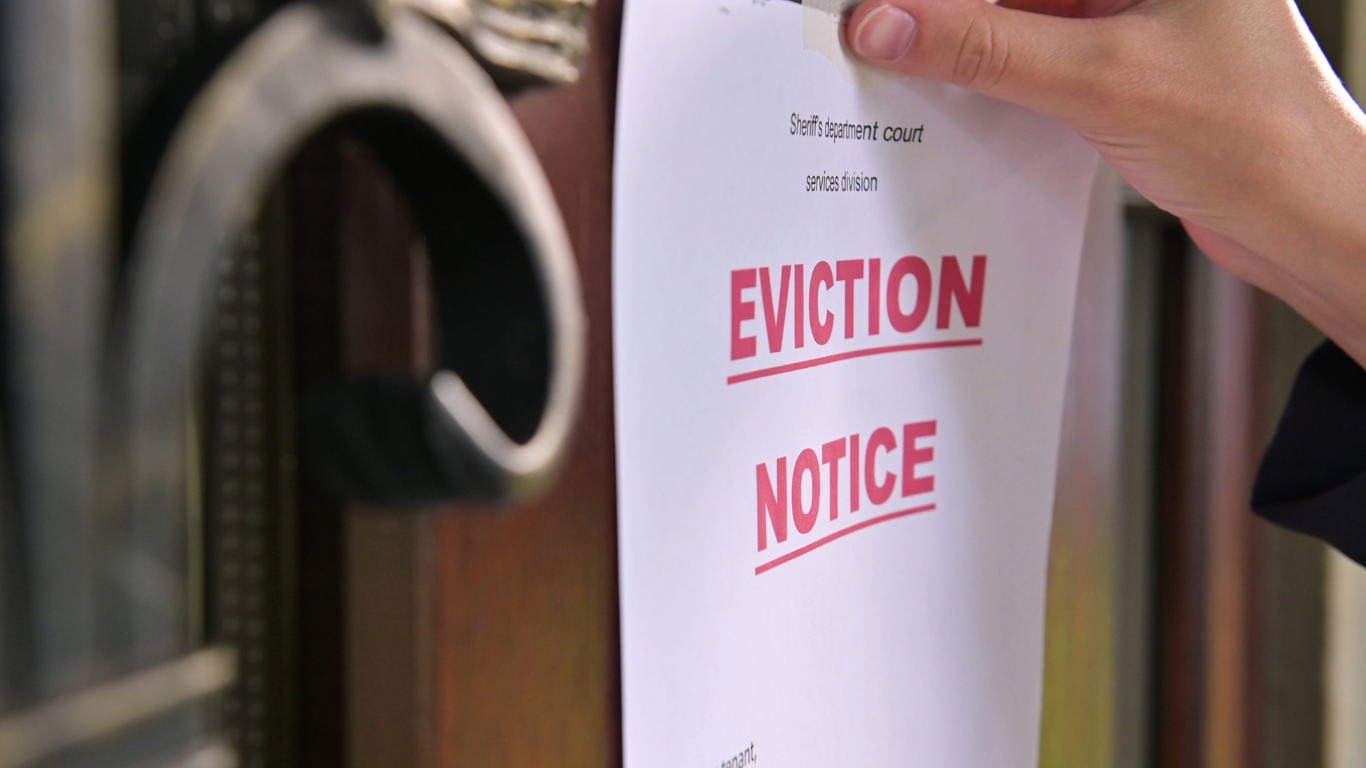Arizona Eviction Laws: 2024 Step by Step Process & Costs
Overview of Evictions in Arizona
Evictions in Arizona must follow the legal process outlined in state law. Landlords cannot take matters into their own hands by locking out tenants or shutting off utilities. Only a court order allows the removal of tenants after following required notices and procedures.
Both landlords and tenants have important rights and responsibilities under Arizona law. Landlords must provide habitable premises, while tenants must pay rent on time and avoid lease violations.
If a tenant breaches the lease, the landlord can terminate tenancy with proper written notice. If the tenant fails to vacate after termination, the landlord must file an eviction lawsuit and win a judgment before a court will order law enforcement to remove the tenant.
The eviction process has several steps and takes time. First, the landlord must serve the tenant a written notice to vacate with an explanation for the termination. The tenant is generally given 5-10 days to move out before the landlord can file a court eviction case. If the tenant contests, it may take weeks or months for a court decision. Tenants can raise defenses against improper evictions.
Overall, landlords in Arizona must follow proper procedures and obtain a court order to legally remove tenants. Self-help lockouts or property seizures are unlawful. Understanding the eviction laws and timeline allows both parties to exercise their rights responsibly.

Grounds for Eviction in Arizona
In Arizona, landlords can evict tenants for cause or without cause. Cause evictions apply when the tenant has violated the lease agreement, while no-cause evictions allow the landlord to terminate month-to-month tenancies without providing a reason.
Eviction for Cause
If the tenant has a fixed-term lease, the landlord cannot terminate the tenancy unless the tenant breaches the lease. Common lease violations that constitute cause for eviction in Arizona include:
- Nonpayment of rent
- Damage to the property
- Excessive noise or disturbances
- Unauthorized occupants or pets
- Drug activity or violence
- Failure to allow landlord access
- Violating condo/HOA rules
For example, if the tenant fails to pay rent on time, the landlord can give a 5-Day Notice to Pay or Quit. If the tenant doesn't pay all owed rent within 5 days, the landlord can file for eviction.
No-Cause Evictions
If the tenant is on a month-to-month tenancy without a lease, the landlord can terminate the tenancy without having to provide a reason. The landlord simply needs to provide a written 30-Day or 7-Day No-Cause Termination Notice.
30 days notice is required for tenancies of 1-2 years. 7 days notice can be given for tenancies less than 1 year.
Required Notices for Eviction in Arizona
Before a landlord can file for eviction, they must properly notify the tenant in writing. The notice must specify the reason for termination and provide the tenant sufficient time to vacate the property.
In Arizona, landlords must provide written notice in the following situations:
- For month-to-month tenancies, landlords must give tenants a 30-Day Notice to Vacate. This allows the landlord to terminate the tenancy for any reason with 30 days' notice.
- For tenants violating the lease or rental agreement, landlords can give a 10-Day Notice to Comply or Quit. This gives tenants 10 days to correct the issue or move out.
- For nonpayment of rent, landlords can give a 5-Day Notice to Pay or Quit. This requires tenants to pay all owed rent within 5 days or vacate.
- For illegal activity on the property, landlords can give a 5-Day Notice of Termination. This requires tenants to move out within 5 days.
Notices must be properly delivered to tenants by certified mail, hand delivery to the unit, or posting on the property. The notice period starts the day after delivery.
Sample 30-Day Notice to Vacate:
Dear [Tenant],
This letter constitutes a 30-day notice to vacate the property located at [address]. As a month-to-month tenant, the rental agreement allows either party to terminate tenancy with 30 days' written notice.
Your tenancy will terminate on [date] at 11:59pm. Please vacate the unit and return all keys and access materials no later than this date. You will be responsible for paying all rent through the termination date.
Thank you,
[Landlord name]
Eviction Timeline in Arizona
After a landlord serves a proper notice of termination, if the tenant does not vacate the property, the landlord can file a forcible detainer (eviction) lawsuit. Here is a general overview of the timeline for evictions in Arizona:
Notice of Termination
The landlord must provide proper written notice to the tenant, with the required timeframe based on the reason for termination. This is typically 5-10 days for nonpayment of rent or other lease violations.
Service of Eviction Summons & Complaint
The landlord files a forcible detainer lawsuit and has the court serve the tenant with a summons and complaint. The tenant has between 3-6 business days to respond.
Tenant Response
The tenant can file an answer contesting the eviction. They may also pay all owed rent to reinstate the tenancy (if eviction is for nonpayment).
Eviction Trial
If the tenant contests, there will be a court hearing where both parties present evidence. The judge will decide if the landlord has grounds to evict.
Judgment
If the landlord wins, the court will issue a written judgment, usually within a few days after the trial.
Writ of Restitution
This court order directs the sheriff or constable to remove the tenants and their belongings. It is served 10-14 days after the judgment.
Physical Eviction
If the tenant does not vacate by the move out deadline in the writ of restitution, law enforcement will forcibly remove them from the property. This is usually within 2-3 weeks after the tenant is served the writ.
The eviction process takes 2-6 weeks from start to finish in most cases. The timeline can vary based on court scheduling and location. Tenants should act promptly to avoid an eviction judgment.
Tenant Defenses Against Eviction
Tenants in Arizona have several legal defenses they can use to fight an eviction case in court. Common defenses include:
Retaliation
If the eviction notice comes right after the tenant complained about poor conditions or exercised other tenant rights, the eviction could be considered illegal retaliation. Tenants should gather evidence of their complaints and note the timing.
Discrimination
Evictions based on race, religion, family status, disability, etc. are prohibited under fair housing laws. Tenants should document any signs of discrimination. Simply alleging discrimination may halt the eviction until an investigation occurs.
Disability Accommodations
Tenants can request reasonable accommodations for disabilities, which could prevent their eviction. For example, allowing an assistance animal despite a "no pets" policy. Tenants should formally request accommodations in writing.
Improper Notice
If the landlord didn't provide the legally required notice, didn't properly serve it, or the notice lacks required content, the eviction is invalid. Tenants should compare the notice to legal requirements.
Substandard Conditions
It may be a defense if the eviction is tied to tenants exercising rights due to uninhabitable conditions. Withholding rent legally until repairs are made, for example. Documentation is key.
Payment Dispute
If nonpayment is the grounds but the tenant has proof they paid or disputes the amount owed, the court may halt the eviction pending resolution of the dispute. Tenants should present evidence.
Lease Violations
Tenants can argue the allegations are false or that the violations don't rise to the level justifying termination. Or violations were truly accidental, isolated incidents.
Hardship
Tenants can try to convince the court to halt the eviction by detailing extreme hardship like illness, disability, or loss of employment. Compassion may sway the judge.
The key for tenants is responding quickly to the eviction notice and gathering solid evidence to support their defense. Consulting a tenant rights group or attorney is highly recommended. Procedural mistakes by landlords can also derail the eviction, so scrutinizing the notice and process is important.
Illegal Eviction Actions in Arizona
Arizona landlords cannot take matters into their own hands when it comes to removing or locking out tenants. Self-help evictions are illegal in Arizona.
Landlords cannot change the locks, shut off utilities, or remove a tenant's belongings in an attempt to force the tenant out. Doing so could make the landlord liable for damages and penalties.
Lockouts
Locking a tenant out of their rental unit is illegal without a court order. Even if the tenant is behind on rent or violating the lease, a landlord cannot lock or block them from entering the property.
If a landlord changes the locks without going through the eviction process, the tenant can call the police or sue the landlord. The court may order the landlord to pay fines, damages, and the tenant's attorney fees.
Utility Shutoffs
Arizona law prohibits landlords from shutting off utilities like electricity, gas, or water in an attempt to make the tenant leave. Utility shutoffs put the tenant's health and safety at risk.
If a landlord shuts off utilities illegally, the tenant can file for an injunction to have them immediately restored. The landlord may have to pay fines, damages, and the tenant's legal fees.
Removal of Tenant's Property
Landlords cannot confiscate or remove a tenant's personal property in order to force them out. The tenant could sue for illegal seizure and conversion of property.
Even after a court-ordered eviction, there are strict rules about properly storing and returning a tenant's belongings. Improper disposal of property could lead to lawsuits.
Tips for Landlords
To avoid penalties, lawsuits, and fair housing violations, Arizona landlords need to fully comply with eviction laws. Never attempt an illegal lockout or property seizure. Only remove tenants and property after getting a writ of restitution from the court. Consult a landlord-tenant attorney if needed.
Tenant Property After Eviction
Once a landlord has legally evicted a tenant and obtained a writ of restitution, the tenant's personal property left behind becomes abandoned property. The landlord must handle the tenant's abandoned property carefully according to Arizona law.
The landlord has the right to remove and store the tenant's abandoned property temporarily. The landlord is required to mail a notice to the tenant's new or forwarding address that the property can be picked up.
If the tenant does not claim the property within 10 days after the notice is mailed, the landlord can dispose of the property however they wish. This includes selling the items, donating them, or simply throwing them away.
It is important for landlords to properly document all abandoned property they remove from the rental unit. The landlord should:
- Create a detailed inventory list describing each item of property
- Take photographs or video showing the condition of the property
- Get a neutral witness to observe and sign off while removing items
- Keep a record of where and when the notice was mailed to the tenant
Proper documentation protects the landlord from claims of theft or damage by the former tenant. Without evidence, the tenant could sue the landlord for the value of property they allege was mishandled.
Landlords should be careful not to damage a tenant's property when removing it after eviction. This includes not putting property out on the curb where it could be damaged by weather or thieves. The landlord is responsible for any loss in value due to their negligence.
Eviction Record & Rental History
An eviction record can stay on a tenant's rental history for years after the court process is completed. In Arizona, eviction cases are public record, so prospective landlords and property managers can easily find past evictions when screening applicants.
Most rental applications ask about prior evictions. Lying about an eviction case can be grounds for denial. So it's important for tenants to be honest and upfront if they have an eviction record.
Many landlords will automatically reject applicants with a prior eviction, especially a recent one. But some may still consider renting to you if the eviction was years ago or if you can explain mitigating circumstances.
It's generally very difficult to remove or seal eviction records in Arizona. However, you may be able to negotiate with your former landlord to vacate a judgment if the eviction was dismissed or you prevailed in court. Consulting a tenant lawyer is recommended.
If you do have an eviction on your record, the best strategy is to save up a larger security deposit and seek landlords who are open to tenants with poor credit or rental history. Having solid income, references, and an explanation letter can also help. Landlords want reassurance you will pay rent reliably.
Some final tips for renting after an eviction include:
- Search for private landlords who may be more flexible than large complexes
- Offer larger prepaid rents or security deposits
- Seek sublets, roommate situations, and month-to-month rentals
- Explain the circumstances of your eviction to landlords upfront
- Ask previous landlords to provide positive references
- Highlight other positive aspects of your application
- Volunteer to sign a repayment plan for any balances owed
- Provide proof of current income and financial stability
While an eviction can hurt your rental prospects, it's not an automatic bar. With perseverance and improved financial health, you can find housing providers willing to give you a second chance.
Resources for Arizona Landlords
Arizona landlords have several resources available to help navigate the eviction process legally and smoothly.
- Arizona Residential Landlord and Tenant Act - The state statutes governing landlord-tenant relations and evictions in Arizona.
- Arizona Courts Self-Service Center - Online guide for landlords filing evictions without an attorney. Provides forms, instructions, and overview of the eviction process.
- Arizona Association of Realtors - Trade association with sample rental agreements, online rental forms, and 10-day notice templates for members.
- Arizona Multihousing Association - Arizona landlord association offers sample rental documents, eviction guides, continuing education and training for members.
- Maricopa County Justice Courts - Self-help landlord resources for Maricopa County including an eviction overview, sample forms, and links to court rules.
- Pima County Consolidated Justice Court - Landlord-tenant forms and overview of the eviction process in Pima county.
- [Arizona Dispute Resolution Association](https://azdra.org/) - Statewide association of mediators and arbitrators including landlord-tenant mediation services.
- [Arizona Tenant Landlord Service](https://tlc.az.gov/) - Free landlord-tenant counseling, dispute resolution, and mediation services in Maricopa County.
Resources for Tenants
Tenants facing eviction in Arizona or having issues with their landlord have several resources available to educate themselves and get help:
Arizona Tenants Advocates
This non-profit organization provides free counseling, advice, advocacy, and legal services for tenants. They can be reached by phone at (602) 258-3434 or online at www.arizonatenants.com.
Community Legal Services
This non-profit law firm assists qualifying low-income residents with civil legal issues, including landlord-tenant disputes and evictions. Visit their website at www.clsaz.org or call their helpline at (602) 258-3434.
AZLawHelp.org
This website contains a wide array of self-help materials for Arizona residents dealing with legal issues. Their rental housing section includes information on tenant rights, the eviction process, and more.
Eviction Guidance from the Arizona Courts
The Arizona Judicial Branch produced this helpful guide on evictions from a tenant's perspective.
Landlord/Tenant Mediation
Tenants can contact their local justice court to inquire about mediation services to resolve disputes with landlords out of court. Mediation can prevent evictions.
Tenants should educate themselves on landlord-tenant laws in Arizona and their rights and responsibilities during rental housing disputes. Seeking help from a tenants' rights organization or attorney can provide guidance during the eviction process.

Frequently Asked Questions
How long does it take to evict a tenant in Arizona?
The eviction process in Arizona can vary in duration, typically ranging from a few weeks to a couple of months, depending on the reason for eviction and the court's schedule. Once an eviction notice is served, tenants usually have 5 days to respond.
What are the grounds for immediate eviction in Arizona?
Immediate eviction in Arizona, also known as a "summary eviction," can occur under conditions such as criminal activity, material and irreparable breaches of the lease (like damage to the property or threats to safety), or falsifying information on the rental application.
How far behind on rent before eviction in Arizona?
In Arizona, landlords can initiate an eviction process as soon as rent is overdue. The landlord must first serve a 5-day notice to pay or vacate before proceeding with filing an eviction.
What is the 30-day notice of eviction in Arizona?
A 30-day notice of eviction in Arizona is typically used for terminating a month-to-month lease or other rental agreements without a fixed term. It must be given at least 30 days before the desired move-out date.
What is Rule 5 in Arizona for eviction?
Rule 5 in Arizona eviction proceedings refers to the requirement that all pre-trial motions, except those made during trial or after judgment, must be made within 20 days after service of the responsive pleading or motion, unless the court allows for a different timeline.
How much notice does a landlord have to give a tenant to move out in Arizona?
For month-to-month tenancies, Arizona landlords must provide at least 30 days' written notice before the tenant is required to vacate the premises. For fixed-term leases, the landlord must wait until the lease ends, unless there is a breach of the lease terms that justifies earlier termination.
Rent Late? Hemlane Eviction Services Can Help
Hemlane offers comprehensive eviction services and on-demand delinquency management. We're here to help you navigate the eviction process, recover owed rent, and minimize court fees and stress. With our expertise and support, you can handle tenant delinquency cases smoothly. Take advantage of Hemlane's eviction services today.



